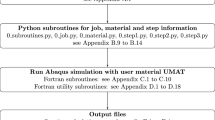Abstract
The non-uniqueness of the trantition from nonobjective constitutive relations to objective ones with the use of the principle of material frame-indifference (PMFI) is shown. To eliminate it, the concept of finite strain without rotations (FSWR) for a given material type and each strain component (elastic, plastic) is introduced. In FSWR the rotation is excluded with respect to the natural preferred configuration for a given material. Considered are a simple solid, a liquid, a monocrystal, a polycrystal and a composite. The proecedure is proposed for consistent generalization of known infinitesimal relations for finite strains and rotations. The structure of constitutive relations is derived for anisotropic elasto-plastic mono- and polycrystalline materials.
Similar content being viewed by others
References
Levitas V I. Theory of large elastoplastic deformations under high pressure. Strength of Materials, 1986, 8: 1094–1103
Levitas V I. Large elastoplastic deformations of materials at high pressure. Kiev: Naukova Dumka, 1987 (In Russian)
Levitas V I. Finite inelastic deformations of homogeneous and composite materials at high pressure. New York: Nova Science Publishers, 1992 (to be published)
Atluri N. On constitutive relations at finite strain: hypoelasticity and elastoplasticity with isotropic or kinematic hardening. Comput Meth Appl Mech and Eng, 1984, 43: 137–171
Dafalias Y F. Cororatoinal rates for kinematic hardening at large plastic deformations. J Appl Mech, 1983, 50: 561–565
Lee E H, Mallett R L. Stress analysis for anisotropic hardening in finite deformation plasticity. J Appl Mech, 1983, 50: 554–560
Loret B. On the effects of plastic rotation in the finite deformation of anisotropic elastoplastic materials. Mech Mater, 1983, 2: 278–304
Mandel J. Equations consitutives et directeurs dans les milieux plastiques et viscoplastiques. Int J Solids and Struct, 1973, 9: 725–740
Kratochvil J. Finite-strain theory of inelastic behavior of crystalline solids. Foundations of plasticity. Sawczuk, A. (ed.). Leiden: Noordhoff, 1973, 401–415
Dafalias Y F. The plastic spin consept and a simple illustration of its role in finite plastic transformations. Mech Mater, 1984, 3: 223–233
Astarita G, Marrucci G. Principles of non-newtonian fluid mechanics, New York: McGraw-Hill, 1974
Levitas V I. Structure of the constitutive relatesions for elasto-plastic composites at finite deformation. Papers of the Ukrainian SSR Academy of Sciences, Ser A, 1989, 3: 43–47 (In Russian)
Levitas V I. Thermomechanics of phase transformations and inelastic deformations in microinhomogeneous materials. Kiev: Naukova Dumka, 1991 (In Russian)
Author information
Authors and Affiliations
Rights and permissions
About this article
Cite this article
Levitas, V.I. On correct account of finite rotations in finite plasticity theory. Acta Mech Sinica 8, 253–260 (1992). https://doi.org/10.1007/BF02489249
Received:
Issue Date:
DOI: https://doi.org/10.1007/BF02489249




